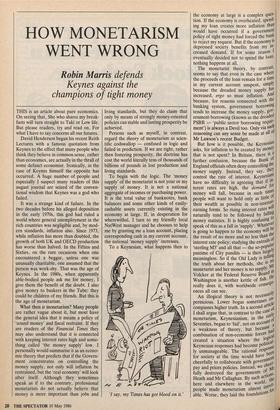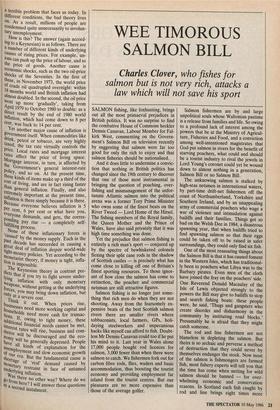HOW MONETARISM WENT WRONG
Robin Marris defends
Keynes against the champions of tight money
THIS is an article about pure economics. On seeing that, She who shares my break- fasts will turn straight to Taki or Low life. But please readers, try and read on. For what I have to say concerns all our futures.
David Henderson began his recent Reith Lectures with a famous quotation from Keynes to the effect that many people who think they believe in common sense, rather than economics, are actually in the thrall of some defunct economist. Ironically, in the case of Keynes himself the opposite has occurred. A huge number of people and especially I suspect many readers of this august journal are seized of the conven- tional wisdom that Keynes was a god who failed.
It was a strange kind of failure. In the two decades before his alleged deposition in the early 1970s, this god had ruled a world where general unemployment in the rich countries was negligible and, by mod- ern standards, inflation also. Since 1973, while inflation has more than doubled, the growth of both UK and OECD production has worse than halved. In the Fifties and Sixties, on the rare occasions when one encountered a beggar, unless one was unusually charitable, one assumed that the person was work-shy. That was the age of Keynes. In the 1980s, when apparently able-bodied people ask me for money, I give them the benefit of the doubt. I also give money to buskers in the Tube: they could be children of my friends. But this is the age of monetarism.
What then is monetarism? Many people are rather vague about it, but most have the general idea that it means a policy of 'sound money' and fiscal restraint. If they are readers of the Financial Times they may also understand that it is connected with keeping interest rates high and some- thing called 'the money supply' low. I personally would summarise it as an econo- mic theory that predicts that if the Govern- ment concentrates on controlling the money supply, not only will inflation be restrained, but the 'real economy' will look after itself. Although they sometimes speak as if to the contrary, professional monetarists do not actually believe that money is more important than jobs and
living standards, but they do claim that only by means of strongly money-oriented policies can stable and lasting prosperity be achieved.
Persons such as myself, in contrast, regard the theory of monetarism as scien- tific codswallop — confused in logic and failed in prediction. If we are right, rather then fostering prosperity, the doctrine has cost the world literally tens of thousands of billions of pounds in lost production and living standards.
To begin with the logic. The 'money supply' of the monetarist is not your or my supply of money. It is not a national aggregate of incomes or purchasing power. It is the total value of banknotes, bank balances and some other kinds of easily- cashable assets currently existing in the economy at large. If, in desperation for wherewithal, I turn to my friendly local NatWest manager and he chooses to help me by granting me a loan account, placing corresponding cash in my current account, the national 'money supply' increases.
To a Keynesian, what happens then to
'I say, my Times has got blood on it.' the economy at large is a complex ques- tion. If the economy is overheated, spend- ing my loan creates more inflation than would have occurred if a government policy of tight money had forced the bank to reject my request. But if the economy is depressed society benefits from my in- creased demand. If for some reason I eventually decided not to spend the loan, nothing happens at all. The monetarist theory, by contrast, seems to say that even in the case where the proceeds of the loan remain for a time in my current account unspent, simplY because the dreaded money supply has, increased, ergo so must inflation. And because, for reasons connected with the banking system, government borrowing tends to increase the money supply, goy- ernment borrowing (known as the dreaded PSBR — 'public sector borrowing requir- ment') is always a Devil too. Only via such reasoning can any sense be made at all of Mr Lawson's recent Budget. But how is it possible, the Keynesian asks, for inflation to be created by moneY that is not spent? In Britain, there is a, further confusion, because the Bank 0' England officials often deny controlling the money supply. Instead, they say, theY control the rate of interest. Keynesians have no difficulty in agreeing that if terest rates are high, the demand fc'r money will fall, because in such times, people will want to hold only as little ot their wealth as possible in non-interes.tt; earning forms. So rising interest rates wt" naturally tend to be followed by failill„g money statistics. It is highly confusing speak of this as a fall in 'supply'. Whatever is going to happen to the economy Will be the result of no more and no less than the, interest rate policy; studying the entrails °I 'sterling M3' and all that — the so-populair pastime of City pundits — is then largo)! meaningless. So if the Old Lady is telling the truth about her methods, she is O Mr monetarist and her money is no supPlY. ., Volcker at the Federal Reserve Board,i; Washington is another kettle of fish. 1-1 really does it, with worldwide consee ences all can see. An illogical theory is not necessarilY pernicious. Lower bogus sometimes ell,; compasses higher truth. In a second ardc,"f I shall argue that, in contrast to the case monetarism, Keynesianism, in the Orli. Seventies, began to 'fail', not on account u; a weakness of theory, but because had combination of non-economic forces created a situation where the Wick Keynesian responses had become politIcase ly unmanageable. The rational respond., for society at the time would have be ot cheerfully to collaborate with governIlleer, pay and prices policies. Instead, we Clle,,,tr fully destroyed the governments of i"ns, Heath and Mr Callaghan. By such aeti°,he here and elsewhere in the world, `,t, people made monetarism almost inev
for able. Worse, they laid the foundations a terrible problem that faces us today. In different conditions, the bad theory lives on. As a result, millions of people are condemned quite unnecessarily to involun- tary unemployment. How is this? The answer (again accord- ing to a Keynesian) is as follows. There are a number of different kinds of underlying causes of rising prices. For example, un- ions can push up the price of labour, and so the price of goods. Another cause is economic shocks, such as the two oil-price shocks of the Seventies. In the first of these, in November 1973, the world price of crude oil quadrupled overnight: within 18 months world and British inflation had almost doubled. In the second, the oil price Went up more 'gradually', taking from April 1979 to October 1980 to double: as a direct result by the end of 1980 world inflation, which had come down to 8 per Cent, was back to 14 per cent. Yet another major cause of inflation is government itself. When commodities like drink, petrol or tobacco, are very highly taxed L , the tax rate virtually controls the Price. Local rates and mortgage interest rates affect the price of living space. Mortgage interest, in turn, is affected by the Government's general interest-rate Policy, and so on. At the present time, these kinds of items make up a third of the cost of living, and are in fact rising faster .than general inflation. Finally, and also extremely important at the present time, inflation is there simply because it is there. Because everyone believes inflation is 5 Per cent, 6 per cent or what have you, everyone demands, and gets, the cones- Pondin g pay rise — a completely self- fulfilling process. , None of these inflationary forces is caused by the money supply. Each in the Past decade has succeeded in causing a great deal of inflation despite world-wide tight-money policies. Yet according to the monetarist theory, if money is tight, infla- tion is impossible. The Keynesian theory in contrast pre- dicts that if you try to fight severe under- IYing inflation with only monetary Weapons without getting at the underlying
lorces,
, You may bring down inflation, but Only at a severe cost. , Think it out. When prices rise, .businesses need more working capital and households need more cash for transac- tions. If, owing to tight money, these additional financial needs cannot be met, interest rates will rise, business and com- merce will be discouraged and the eco- nemy will be generally depressed. People have all kinds of explanation for the nemployment and slow economic growth su! our era. But the fundamental cause is 2:lertage of 'real' demand caused by I 0 netary restraint in face of untamed underlying inflation. n,oW, as (here no other way? Where do we _rrnm here? I will answer these questions " ct second instalment.



























































 Previous page
Previous page